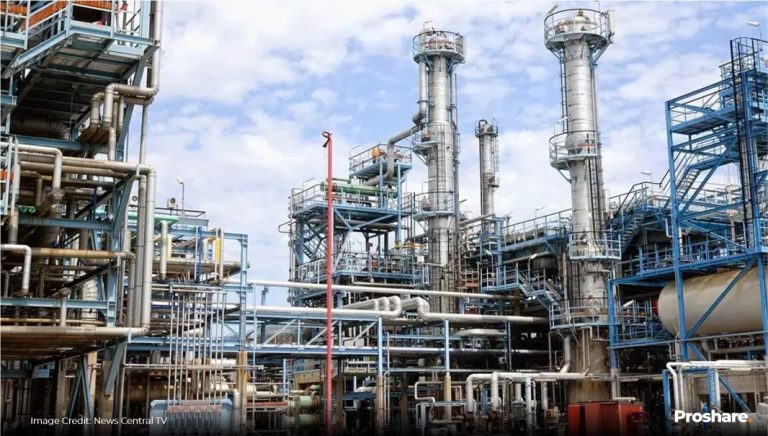…Warri running at 60% capacity — Tinubu
…Naira rebound predicted on lower dollar demand
The Nigerian National Petroleum Company Limited (NNPC Ltd) has announced the official reopening of the Warri refinery after undergoing an $898 million refurbishment, brightening the nation’s petrol refining outlook.
Analysts see the resumption of Warri and Kaduna refineries as well as the continued operations of the giant Dangote Refinery easing dollar demand in the foreign exchange market.
The refinery heralds a significant milestone in the country’s efforts to achieve energy self-sufficiency, analysts say.
Located in Delta State, the Warri Refinery is one of Nigeria’s oldest petroleum facilities, with operations dating back to 1978 to cater to the markets in Nigeria’s southern and southwestern regions.
Uche Uwaleke, director of the Institute of Capital Market Studies at Nasarawa State University, forecasts a positive trajectory for the naira and FX market in 2025, attributing this outlook to lower petrol and food importation as well as increased fuel exports next year.
Uwaleke pointed to the reduced importation of petroleum products as a major driver of the naira rebound.
“With increased domestic refining capacity, we expect a significant decline in fuel imports, which will ease pressure on foreign exchange demand and strengthen the naira,” he explained.
The Warri Refinery has suffered almost a decade of shutdowns, one of a string of long-running failures that have left Africa’s largest crude exporter importing most of its fuel.
Read also: Tinubu hails NNPC over 125,000bpd Warri refinery re-opening
Mele Kyari, group chief executive officer (GCEO) of the NNPC, announced on Monday that the refinery had become operational.
“We are taking you through our plant. You see the reality yourself. This plant is running. We have not completed 100 per cent,” Kyari explained.
He added, “We are stimulating the other part of the plant as we progress. But currently, this plant is running. You will see what is happening now and we are bringing products to the market,”
Situated in Ekpan, Uwvie, and Ubeji areas of Warri, the petrochemical plant has an annual production capacity of 13,000 metric tons of polypropylene and 18,000 metric tons of carbon black.
“There are many people who don’t think this is real. As you all know a lot of media talk all over the place that people don’t believe real things can happen in our country,” Kyari explained.
Additional production from the Warri plant moves Africa’s top oil-producing nation closer to becoming self-sufficient in locally consumed refined products following the resumption of the giant 650,000-barrels-a-day Dangote refinery in Lagos, which began operations earlier this year.
While fuel importation has not completely stopped, ramping up domestic production could cut foreign exchange demand by at least 15 percent, according to the Central Bank of Nigeria.
Last month, the NNPC said production had resumed at its oldest plant, a 60,000 barrels-per-day crude processor in Port Harcourt, which was operating at 70 percent capacity, while rehabilitation works continued at a third refinery in Kaduna.
A privately-owned 650,000 bpd Dangote oil refinery built by Nigerian billionaire Aliko Dangote in Nigeria’s commercial capital Lagos started operations this year.
Presidency reactions
Bayo Onanuga, special adviser to the president on information and strategy, said the refinery will focus on producing and storing critical products, including straight-run kerosene (SRK), automotive gas oil (AGO), and heavy and light naphtha.
According to Onanuga, President Bola Tinubu said with the 125,000 bpd refinery “now operating at 60 percent capacity,” his administration’s comprehensive plan to ensure energy efficiency and security “is entirely on course.”
“The restart of Warri Refinery today brings joy and gladness to me and Nigerians. This will further strengthen the hope and confidence of Nigerians for a greater and better future that we promised,” Tinubu was quoted as saying.
Experts’ reactions to local refineries
Adeola Adenikinju, an energy scholar at the University of Ibadan, said there is a need for domestic refineries, both existing and new ones, to come into operation to enable the country to save foreign exchange on petrol imports and transit to exports.
“However, the nation must reach a consensus as to who would run the refineries to give value to the country,” he added.
Segun Ajibola, former president of the Chartered Institute of Bankers of Nigeria (CIBN) and professor of economics at Babcock University, said while the rehabilitation of the refineries has taken time, getting the facilities on track would lessen the plight of Nigerians.
“The challenge has been continued importation of refined products, which costs are annexed to the foreign exchange rate,” he said.
